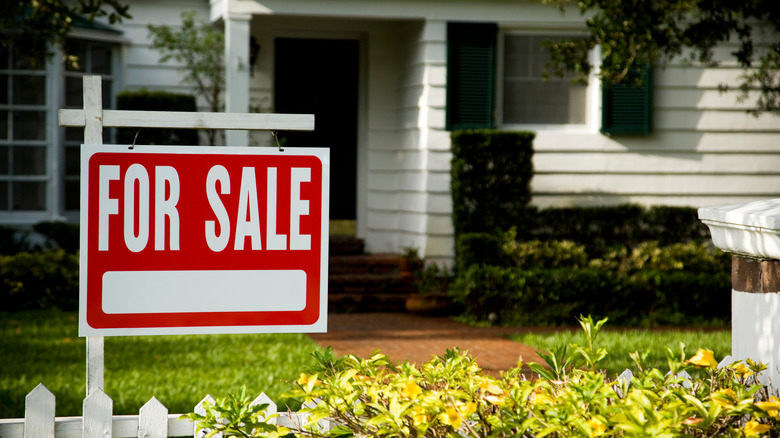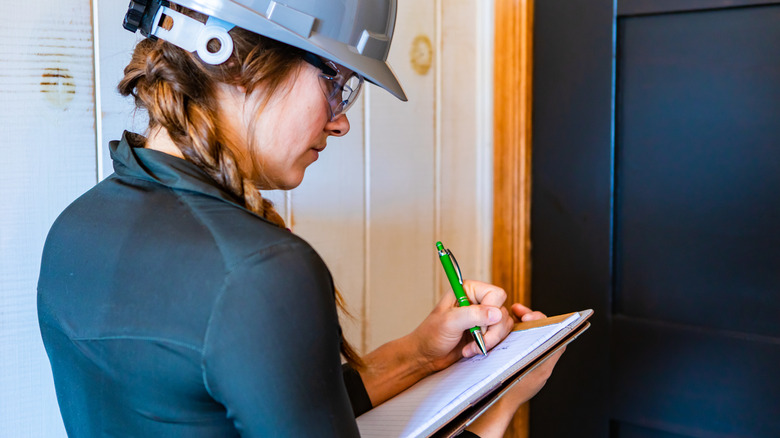Everything You Need To Know About Preparing To Sell Your House
Having been considered a seller's market by Investopedia since the late 2010s, the real estate market is currently primed for sellers looking to capitalize on the limited inventory of available properties mixed with high offer prices from buyers. Because of this, you've likely thought about selling your home every now and again, but if you've decided that it's the right time to put your house on market, there are a few things you should know and do before diving in head first, especially if you're a first-time seller.
And although some of the things may be more apparent than others, like cleaning your home and having repairs done, even the most obvious components of preparing your house for the market may be more complex than you think. Overall, you should be ready for just about anything as the real estate market has been known to be unpredictable (via Forbes).
Cleaning can be key
While keeping your home clean may seem like an obvious part of putting it up for sale, your home's cleanliness may be more complicated than just daily upkeep and getting rid of junk. Zillow, in particular, has reported that your home's cleanliness can signal a number of things to prospective buyers, including lacking upkeep when it comes to bigger maintenance issues. To counteract this, plan on deep cleaning each room, including your closets and storage spaces, tending to your property's curb appeal, and removing any sign of or odor caused by your pets (via The Balance).
Have an inspection done
One of the best ways to prepare your home for the market is by opting to have a home inspector come to take a look at it. While visiting your home, the inspector will determine a number of things, including whether or not the home is structurally sound and has outdated plumbing and electrical systems (via Zillow). Overall, pre-inspections can help you figure out what parts of your home will need the most care and upkeep, according to OpenDoor, as well as what parts of your home could be a dealbreaker for potential buyers.
Handle repairs and touch ups
Following your pre-inspection, you should plan on repairing and touching up anything that isn't working properly, is outdated, and has been damaged while you've been living in the home. The necessity of the repairs may vary and can include painting over scuff marks, installing new light fixtures and appliances, and replacing faulty pipes or wiring, according to Realtor. Overall, repairing the broken and outdated parts of your home can be an important part of the selling process as you may see your home's value increase with each project you do (via First State Community Bank).
Have your home appraised
While home appraisals are often associated with buyers, prospective sellers should consider having one done before listing their house, as there are a number of benefits to home appraisals. In particular, having an appraisal done can help you figure out the right price for your property, which in turn can help sell your house faster, according to Nationwide. And even if you aren't ready to part with your home, appraisals can still be helpful as they may determine if you've reached the threshold required to remove the added expense of mortgage insurance (via Mathis Title Company).
Utilize home staging
Whether it's done by professionals or not, home staging can be as simple or as complex as you want it to be. If you choose to do it yourself, a good place to start is by taking down your family photos and decluttering each room, according to HGTV. Remember that your goal with staging is to make your home look as presentable and homey as possible so buyers can easily imagine themselves living there. This can be done by making your bed, setting your tables, adding in plants, and painting your walls a neutral color (via Investopedia).
Figure out the pricing
Likely one of the complicated parts of preparing your home for the market is figuring out the right asking price. And although having a real estate appraiser assess your residence can be a big help, it is just one of the many ways you can go about determining the price (via Forbes). According to Homelight, the five biggest factors that can influence your home's price point are the house's location, the prices of recently sold homes, the condition of the house, any improvements, updates, or additions, and determining the conditions of the market in your area.
Market your home
Once you've found the right price and handled your repairs and staging, you can begin the process of marketing your home. If you decide to do it yourself, you'll want to make sure you have the information needed to properly list the home, as well as an experienced photographer to take photos of your property. From there, you'll want to list it under for sale by owner on sites like Zillow and share it on social media. If you use an agent, the marketing process becomes more simplified as the agent will handle advertising the information (via Investopedia).







